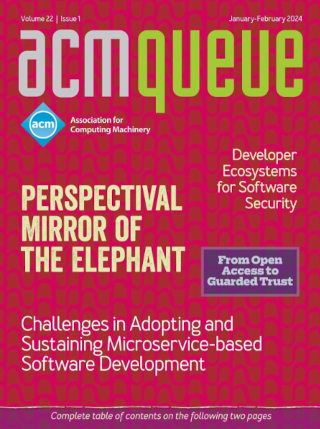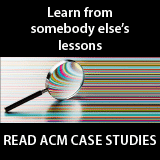The Parchment Path?:
Is there ever a time when learning is not of value - for its own sake?
The greater the risk, the greater the reward, and if you do succeed, it will be an achievement that you can look back on and smile wryly about. Postdocs never laugh because postdocs are post-laughter. However, there are some things to consider before plunking down your application fee and writing all those essays.
Koding Academies:
A low-risk path to becoming a front-end plumber
Encourage your friend to pick a course that will introduce concepts that can be used into the future, rather than just a specific set of buzzword technologies that are hot this year. Most courses are based around Python. Encourage your friend to study that as a first computer language, as the concepts learned in Python can be applied in other languages and other fields.
Vigorous Public Debates in Academic Computer Science:
Expert-curated Guides to the Best of CS Research
This installment of Research for Practice features a special curated selection from John Regehr, who takes us on a tour of great debates in academic computer science research. In case you thought flame wars were reserved for Usenet mailing lists and Twitter, think again: the academic literature is full of dramatic, spectacular, and vigorous debates spanning file systems, operating system kernel design, and formal verification.
Four Ways to Make CS & IT Curricula More Immersive:
Why the Bell Curve Hasn’t Transformed into a Hockey Stick
Our first experiences cement what becomes normal for us. Students should start off seeing a well-run system, dissect it, learn its parts, progressively dig down into the details. Don’t let them see what a badly run system looks like until they have experienced one that is well run. A badly run system should then disgust them.
Evolution of the Product Manager:
Better education needed to develop the discipline
Software practitioners know that product management is a key piece of software development. Product managers talk to users to help figure out what to build, define requirements, and write functional specifications. They work closely with engineers throughout the process of building software. They serve as a sounding board for ideas, help balance the schedule when technical challenges occur - and push back to executive teams when technical revisions are needed. Product managers are involved from before the first code is written, until after it goes out the door.
Privacy, Anonymity, and Big Data in the Social Sciences:
Quality social science research and the privacy of human subjects requires trust.
Open data has tremendous potential for science, but, in human subjects research, there is a tension between privacy and releasing high-quality open data. Federal law governing student privacy and the release of student records suggests that anonymizing student data protects student privacy. Guided by this standard, we de-identified and released a data set from 16 MOOCs (massive open online courses) from MITx and HarvardX on the edX platform. In this article, we show that these and other de-identification procedures necessitate changes to data sets that threaten replication and extension of baseline analyses. To balance student privacy and the benefits of open data, we suggest focusing on protecting privacy without anonymizing data by instead expanding policies that compel researchers to uphold the privacy of the subjects in open data sets.
Undergraduate Software Engineering: Addressing the Needs of Professional Software Development:
Addressing the Needs of Professional Software Development
In the fall semester of 1996 RIT (Rochester Institute of Technology) launched the first undergraduate software engineering program in the United States. The culmination of five years of planning, development, and review, the program was designed from the outset to prepare graduates for professional positions in commercial and industrial software development.
Pride and Prejudice: (The Vasa):
What can software engineers learn from shipbuilders?
I teach computer science to undergraduate students at a school in California, and one of my friends in the English department, of all places, made an interesting comment to me the other day. He wanted to know if my students had ever read Frankenstein and if I felt it would make them better engineers. I asked him why he thought I should assign this book, and he said he felt that a book could change the way in which people think about their relationship to the world, and in particular to technology. He wasn’t being condescending; he was dead serious. Given the number of Frankenstein-like projects that seem to get built with information technology, perhaps it’s not a bad idea to teach these lessons to computer science undergraduates, to give them some notion that they have a social responsibility.
Finding the Right Questions:
Does the world really need another computing magazine?
Does the world really need another computing magazine? Surely, that’s a legitimate question. By any measure, we already have an overwhelming number of publications to choose from. But how many do you actually read? And of those, how many do you feel really contribute to your knowledge and understanding of emerging software technologies and capabilities?






